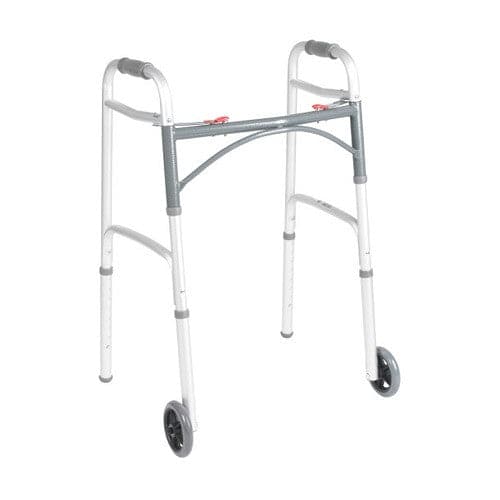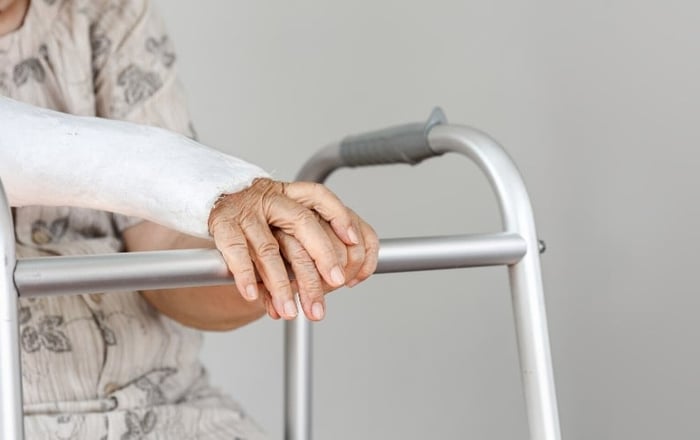There are 3 main types of walkers to choose from standard walkers, 2-wheel walkers, and rollator walkers. Learn more about which walker to choose here.
Are you looking to update your old walker or have decided you need increased mobility? Finding the right walker for you may seem daunting because of all the options available, but if you focus on your needs and comfort first, this guide will help you find one you’re satisfied with within no time.
To gain a deeper insight into the world of walkers, we recommend exploring the following resources:
- Your Guide to Using a Walker the Right Way
- How to Use a Walker, A Beginners Guide
- Tips for Safely Exercising with a Walker
- Everything you Need to Know About Walkers
- How to Use a Walker Climbing Stairs
Read on as we go through the three types of walkers available on the market today, and how to find the best one for you!
Three Main Types of Walkers
Remember that there is no “best” kind of walker. As you read through these descriptions, consider what would be the most comfortable for you. You’ll also want to ensure that you’re granted the mobility you desire while also being able to control the walker easily.
For each type of walker, you’ll want to consider:
- Height adjustment range
- Weight
- Foldable walkers for travel
- Seats or storage baskets
For instance, if you know you get tired after walking long distances, perhaps you’d want a walker with a seat for short rests or a basket to hold items that would make holding your walker difficult without one.
If you travel often or use the bus, a foldable walker will make it far easier to travel with. Lastly, most walkers are able to adjust for your height, so make sure it has an adjustment range that suits you.
What is a Standard Walker?
Standard walkers are also called Zimmer frames. They’re made with a metal frame and four legs. Standard walkers are the most common and don’t come with wheels.
Because you’ll be picking them up and down, you’ll want to make sure you choose a lightweight frame. The main negative of these walkers is that people get tired from picking them up each time they need to move forward.
Walkers with no wheels are best used on indoor surfaces. Their main benefit is that they give you extra stability and allow you to bear more weight on the device. Many of them are also incredibly easy to transport because they’re foldable and lightweight.
Lastly, you’ll find that standard walkers are the most affordable compared to other types. If you’re on a tight budget but still need to invest in something sturdy and reliable, these types of walkers are a great choice.
Carex Dual Button Folding Walker

$78.00
Carex Dual Button Folding Walker If you’re finding that age or a mobility issue is holding you back from doing the things you love, get a Carex Dual Button Folding Walker! This walker will make it easy for you to get… read more
What is a Two-Wheeled Walker?
These rolling walkers have two front wheels and two back sliders, making forward movement both indoors and outdoors much easier. Two-wheeled walkers are perfect for people who have some instability but don’t need to completely bear their weight on the device.
The front wheels on these devices are often fixed, meaning that you’ll have a wide turning radius and may be tempted to just pick it up in order to turn. However, the correct and safe way to turn with these walkers is to make multiple small turns till you’re in the direction you desire.
Drive Medical PreserveTech Deluxe Folding Walker Two Button With 5" Wheels

$66.00
Drive Medical PreserveTech Deluxe Folding Walker Two Button With 5” Wheels Drive Medical Deluxe Folding Walker is an excellent option for those looking for a quality walker that can accommodate a wide range of individual needs. With its two-button functionality… read more
What is a Rollator Walker?
Rollator walkers have four wheels. These wheels are fully rotating with brakes, and they often come with a seat and a basket as well. These walkers give you the most mobility and agility. However, because they’re easier to propel and maneuver, they’re only suitable for people who have some balance issues but don’t need to rest their weight against the device.
The brakes alone on a Rollator aren’t able to keep it stable enough if you need to frequently rest your weight on the device to stay upright.
Their wheels, baskets, and seats also make them bulkier compared to standard and two-wheel walkers. While traveling with them is still possible, it won’t be as easy.
These types of walkers are the most expensive due to the extra parts.
Test Your Walkers Out
Once you’ve weighed your options and asked for your doctor’s recommendation, remember that you still have time to test out your walker.
If you’re searching for one online, pay attention to the number of reviews it’s received and whether they’re positive or negative. Although one or two negative reviews are normal, if a walker has a majority of negative reviews, this is a good indication to stay away.
You’ll also want to pay attention to the returns policy of the company you’re buying your walker from. Make sure that they have one in place that allows at least 30 days to return the item for a full refund. That way, you won’t be stuck with a walker that isn’t right for you!
Remember that if you are Canadian you will need to check with your insurance company. If you are in the United States and have Medicare Part B, the supplier may be able to accept the assignment.
How to Choose the Best Walker for You
Now that you have an idea of what these types of walkers can do for you, consider your needs and whether the walker you prefer would be able to meet them.
For instance, if you travel often but don’t have as much need for a device that needs to hold your weight for balance, a Rollator four-wheel walker may be the best choice for you. Although it will be harder to pack onto a bus, you’ll have greater mobility once you’re off it.
In contrast, two-wheel or standard walkers are your best choices if you need the extra support they’re able to give you.
Ready to begin your journey of increased mobility? Take a look at all of our affordable walking aids today!










